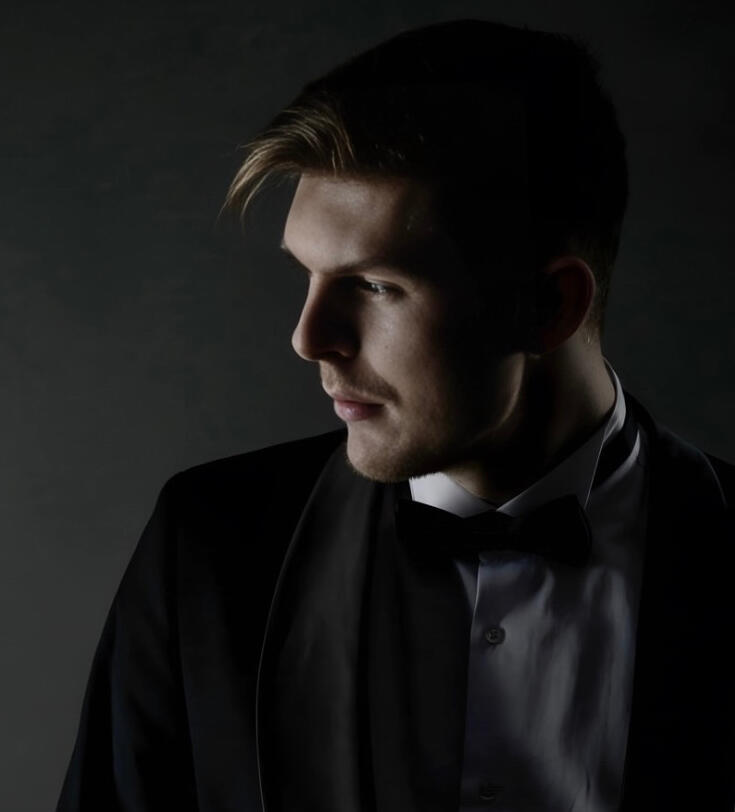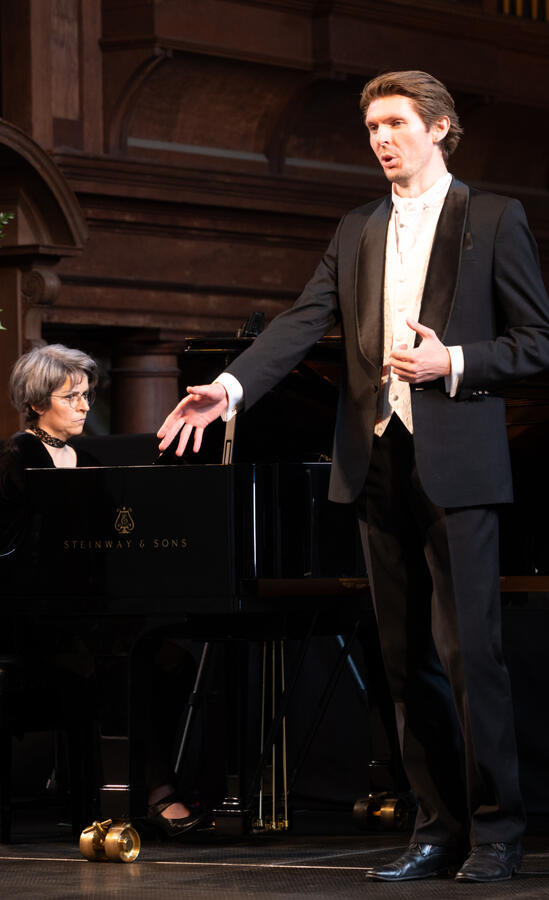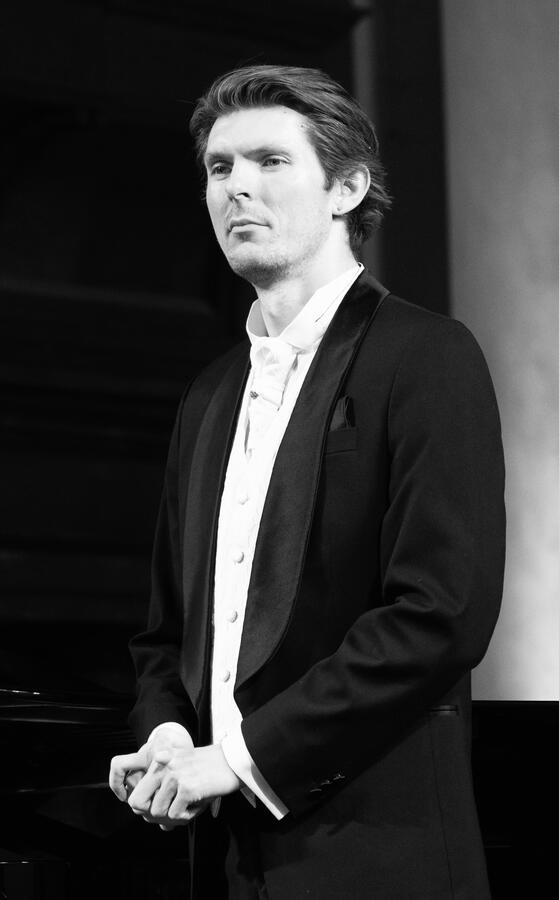Manchester, 6 October
Russian Artsongs
Powerful and intimate recital exploring two extremes of the human soul: the yearning lyricism of Tchaikovsky and the ruthless drama of Mussorgsky. Performed by former Mariinsky Theatre musicians — baritone Efim Zavalny, pianist Rebekka Magomedova.
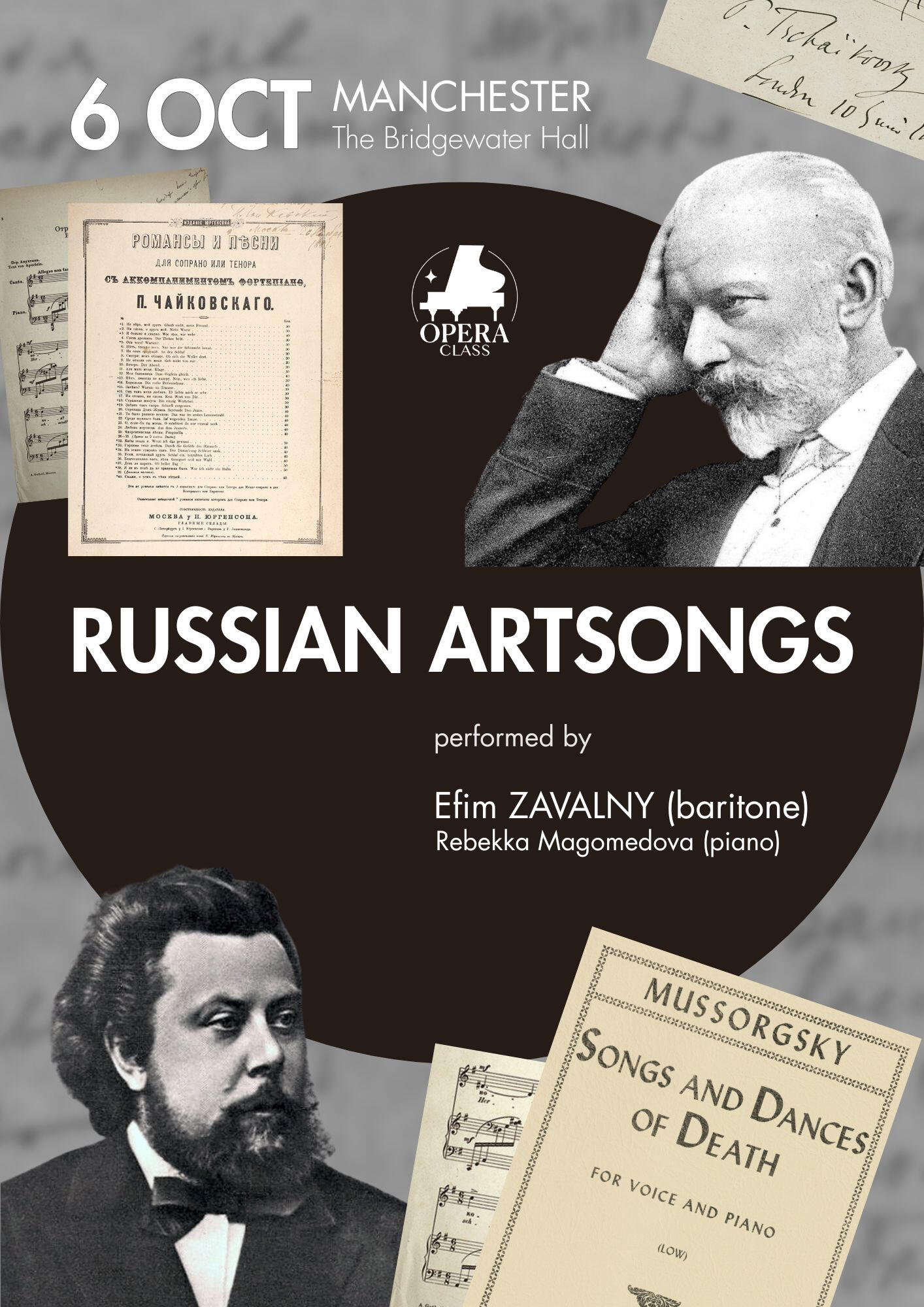
Tchaikovsky and Mussorgsky
Two Worlds in Song
Though born just five years apart, Pyotr Ilyich Tchaikovsky (1840–1893) and Modest Mussorgsky (1839–1881) represent two profoundly different artistic paths in Russian music.Both were deeply invested in the expressive potential of the human voice — but approached it in opposite ways. Tchaikovsky, shaped by the conservatory tradition and a lover of European form, sought beauty, clarity, and emotional resonance. For him, poetry was a source of inspiration — a springboard into music. His songs do not aim to imitate speech, but to elevate it — transforming personal feeling into lyrical, universal melody.Mussorgsky, by contrast, was a radical innovator and a member of the “Mighty Handful,” a group devoted to forging a truly Russian sound. He treated language not as a spark for music, but as its raw material. In his vocal works, especially Songs and Dances of Death, the rhythm, syntax, and inflection of speech are preserved with startling realism. His music is unvarnished, dramatic, and often brutal — anticipating the directness of 20th-century expressionism.
Programme
Tchaikovsky
1. “I Opened the Window” (Op. 63, No. 2) – A reflection of love for one’s homeland.2. “Reconciliation" (Op. 25, No. 1) – A man struggling to silence his own heart.3. “Amidst the Din of the Ball” (Op. 38, No. 3) – A fleeting encounter at a ball that leaves a lasting mark.4. “Don Juan’s Serenade” (Op. 38, No. 1) – Another bold serenade from the most irresistible figure of all time.5. “A Hero’s Deed” (Op. 60, No. 12) – A Christian vision of humility and sacrifice.6. “Bless You, Forests” (Op. 47, No. 5) – A hymn to creation, inspired by ancient funeral chants of St. John of Damascus.
Programme
Mussorgsky
Songs and Dances of Death (1875–1877) is a song cycle in four parts, composed to poems by Arseny Golenishchev-Kutuzov. In this song cycle, Mussorgsky gives Death a series of human masks, turning her into a distinct character in each song. In Lullaby, she resembles a visiting doctor or caregiver, gently soothing a dying child. In Serenade, she appears as a passionate lover, a fevered vision of a young woman dying of tuberculosis. In Trepak, Death is a drinking companion to a peasant lost in a snowstorm. And in the apocalyptic final song, The Field Marshal, Death is a military commander who triumphs over all - "life parted you, I have brought you peace".
1. Lullaby2. Serenade3. Trepak4. The Field Marshal
Sign up to receive updates about our concerts and projects.
translation
Растворил я окно
I Opened the Window
Lyrics by Grand Duke Konstantin Romanov (K. R.)
Music by Pyotr Tchaikovsky
The painting “The Window” by Valentin Serov, 1886.
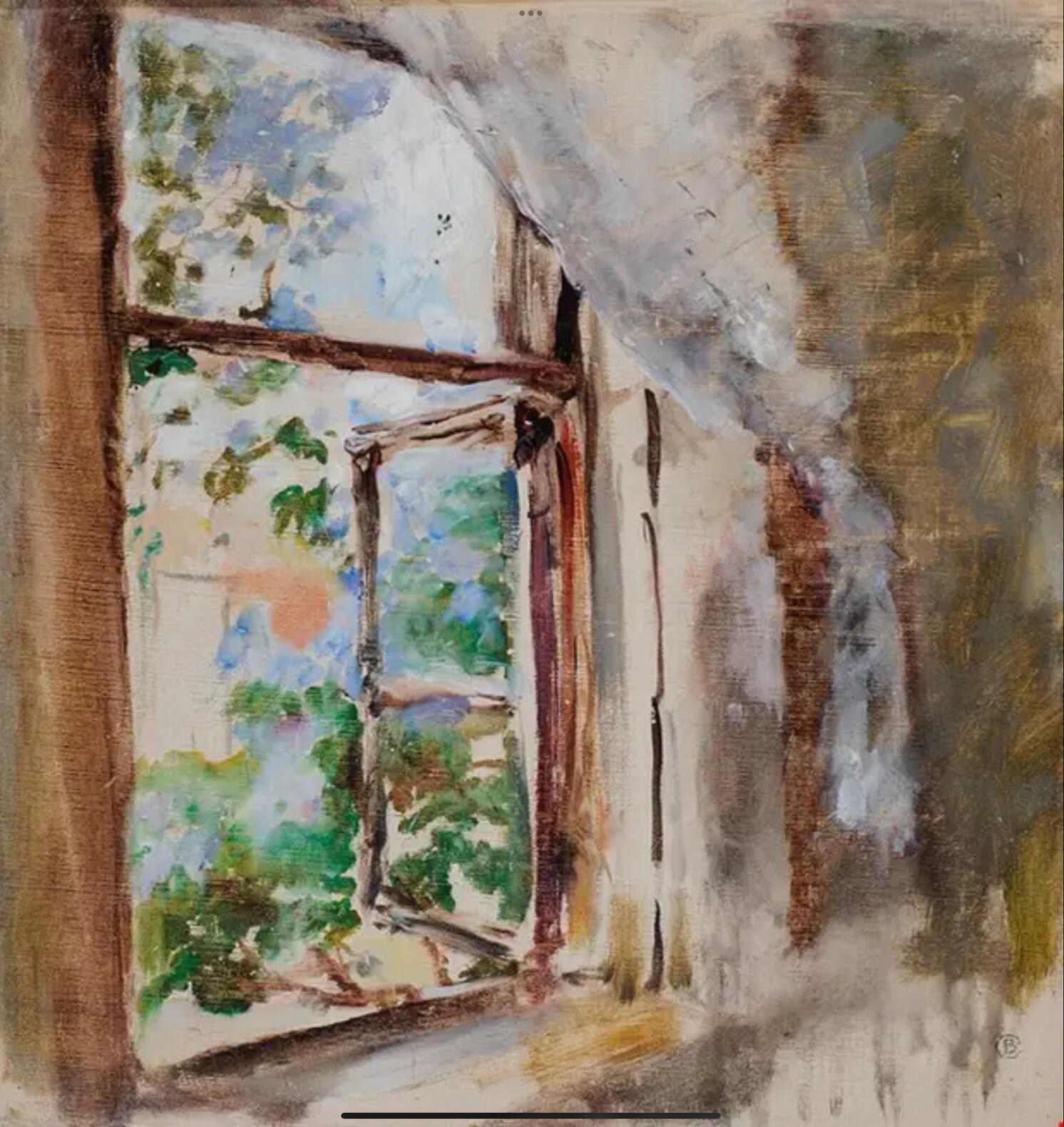
Растворил я окно, стало душно
невмочь,
I opened the window — it was unbearably stifling,Опустился пред ним на колени.
And knelt down before it.И в лицо мне пахнула весенняя ночь
And into my face breathed the spring nightБлаговонным дыханьем сирени.
With the fragrant breath of lilac.⸻А вдали где-то чудно запел соловей,
And somewhere in the distance, the nightingale began to sing wonderfully,Я внимал ему с грустью глубокой,
I listened to it with deep sadness,И с тоскою о родине вспомнил своей,
And with longing I remembered my homeland,Об отчизне я вспомнил далёкой,
I remembered my faraway fatherland.⸻Где родной соловей песнь родную поёт
Where the native nightingale sings its native song,И, не зная земных огорчений, —
And, knowing nothing of earthly sorrows —Заливается целую ночь напролёт
It pours out its song the whole night longНад душистой веткой сирени…
Above the fragrant lilac branch…
.
Примирение
Reconciliation
Lyrics by Nikolai Scherbina
Music by Pyotr Tchaikovsky
The painting “Dandelions” by Isaac Levitan, 1886
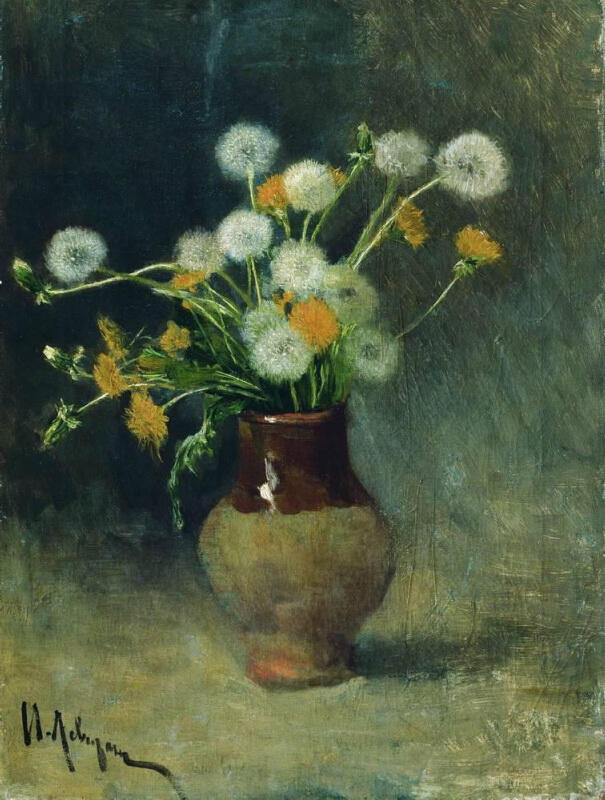
О, засни, мое сердце, глубоко!
Oh, sleep, my heart, sleep deep!Не буди: не пробудишь, что было,
Do not wake — you cannot awaken what once was,Не зови, что умчалось далёко,
Call not to what has rushed far away,Не люби, что ты прежде любило…
Love not what you once used to love…Пусть надеждой и лживой мечтой
Let not hope or a lying dreamНе смутится твой сон и покой!
Disturb your sleep and your peace!⸻Для тебя невозвратно былое,
The past is gone from you forever,На грядущее нет упованья.
There is no hope in what lies ahead.Ты не знало в блаженстве покоя,
You never knew peace in bliss,Успокойся ж на ложе страданья
So find your rest on the bed of sorrow,И старайся не помнить зимой,
And try not to remember in winter,Как срывало ты розы весной!
How you once plucked roses in spring!⸻О, засни, мое сердце, глубоко!
Oh, sleep, my heart, sleep deep!Не буди: не пробудишь, что было,
Do not wake — you cannot awaken what once was,Не зови, что умчалось далёко,
Call not to what has rushed far away,Не люби, что ты прежде любило…
Love not what you once used to love…Пусть надеждой и лживой мечтой
Let not hope or a lying dreamНе смутится твой сон и покой!
Disturb your sleep and your peace!Не смутится твой сон и покой!
Disturb your sleep and your peace!⸻И старайся не помнить зимой,
And try not to remember in winter,Что срывало ты розы весной.
That you once plucked roses in spring.
Средь шумного бала
Amidst the Din of the Ball
Lyrics by Alexei Tolstoi
Music by Pyotr Tchaikovsky
The painting “Ball in the Concert Hall of the Winter Palace” by Mihály Zichy, 1874
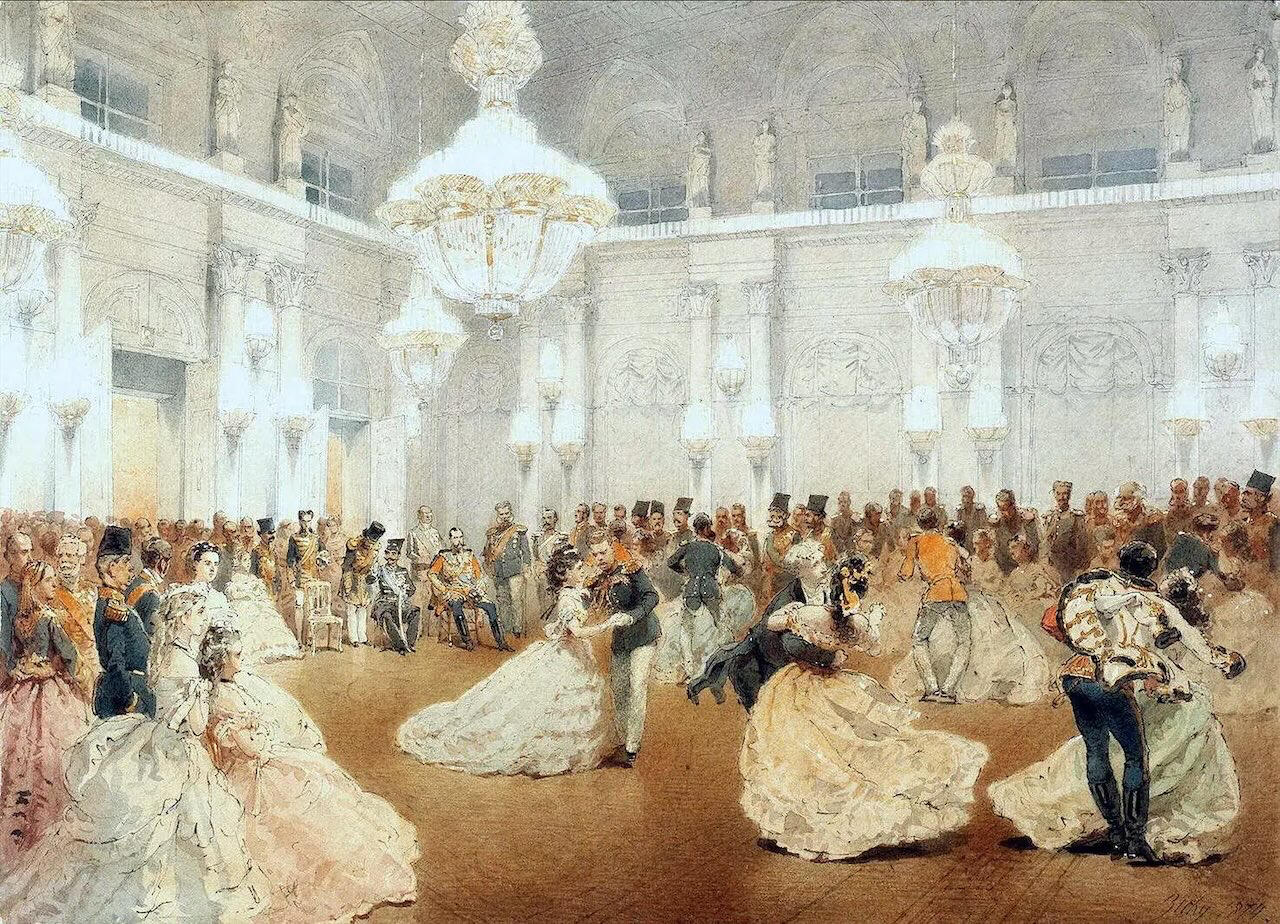
Средь шумного бала, случайно,
Amid the din of the ball, by chance,В тревоге мирской суеты,
In the turmoil of worldly fuss,Тебя я увидел, но тайна
I saw you — yet mystery softlyТвои покрывала черты.
Veiled the features of your face.⸻Лишь очи печально глядели,
Only your eyes gazed with sorrow,А голос так дивно звучал,
And your voice rang out so strange and sweet,Как звон отдалённой свирели,
Like a far-off shepherd’s reed,Как моря играющий вал.
Like the sea’s soft-rolling swell.⸻Мне стан твой понравился тонкий
Your slender form struck me deeply,И весь твой задумчивый вид,
And all of your thoughtful grace,А смех твой, и грустный и звонкий,
And your laugh — both bright and grieving —С тех пор в моём сердце звучит.
Since then in my heart it rings.⸻В часы одинокие ночи
In the lonely hours of nightЛюблю я, усталый, прилечь —
I love, worn out, to lie down —Я вижу печальные очи,
I see your sorrowful eyes,Я слышу весёлую речь;
I hear your light-hearted speech;⸻И грустно я так засыпаю,
And I fall asleep so sadly,И в грёзах неведомых сплю…
And I dream in unknown dreams…Люблю ли тебя — я не знаю,
Do I love you? — I do not know,Но кажется мне, что люблю!
But it seems to me that I do!
.
Серенада Дон Жуана
Don Juan's Serenade
Lyrics by Alexei Tolstoi,
Music by Pyotr Tchaikovsky
The painting “Don Juan and Donna Anna” by Ilya Repin, 1886
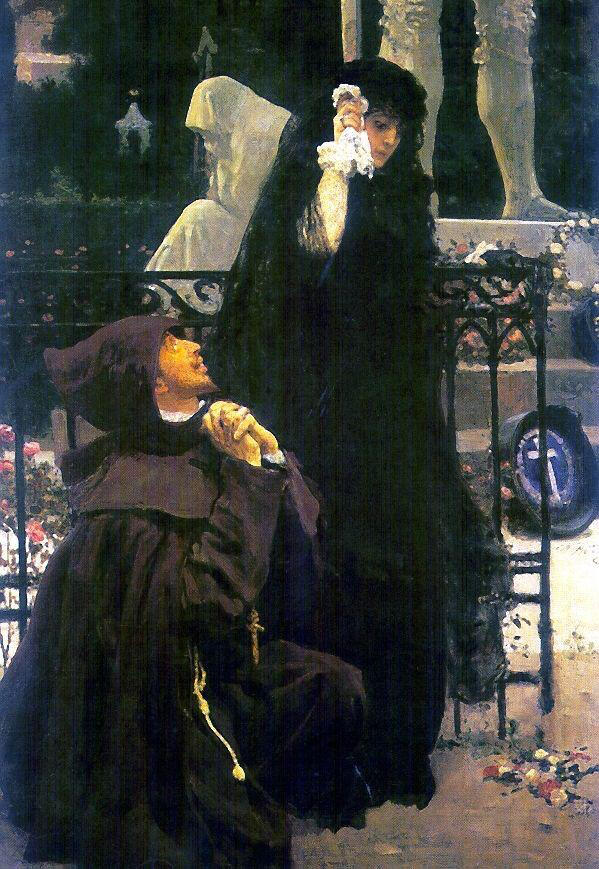
Гаснут дальней Альпухары
Золотистые края.
The golden edges
of far Alpujarra fade.На призывный звон гитары
Выйди, милая моя.
Come out, my darling,
to the call of my guitar.Всех, кто скажет, что другая
Здесь сравняется с тобой,
All who dare to say another
could compare to you —Всех, любовию сгорая,
Всех зову на смертный бой.
Burning with love,
I call them to a deadly duel.⸻От лунного света
Зардел небосклон,
The moonlight has blushed
across the sky,О, выйди, Нисета,
О, выйди, Нисета,
Скорей на балкон!
Oh come, Niseta,
Oh come, Niseta,
Out onto the balcony!⸻От Севильи до Гренады,
В тихом сумраке ночей,
From Seville to Granada,
in the hush of night,Раздаются серенады,
Раздается стук мечей.
Serenades are heard,
and the clash of blades.Много крови, много песен
Для прелестных льется дам,
Much blood, many songs
are spilled for lovely ladies —Я же той, кто всех прелестней,
Песнь и кровь свою отдам.
But to the loveliest of all,
I give both song and blood.⸻От лунного света
Зардел небосклон.
The moonlight has blushed
across the sky,О, выйди, Нисета,
О, выйди, Нисета,
Скорей на балкон!
Oh come, Niseta,
Oh come, Niseta,
Out onto the balcony!
Подвиг
A Hero's Deed
Lyrics by Alexei Khomyakov,
Music by Pyotr Tchaikovsky
The painting “Christ in the Wilderness” by Ivan Kramskoi, 1872.
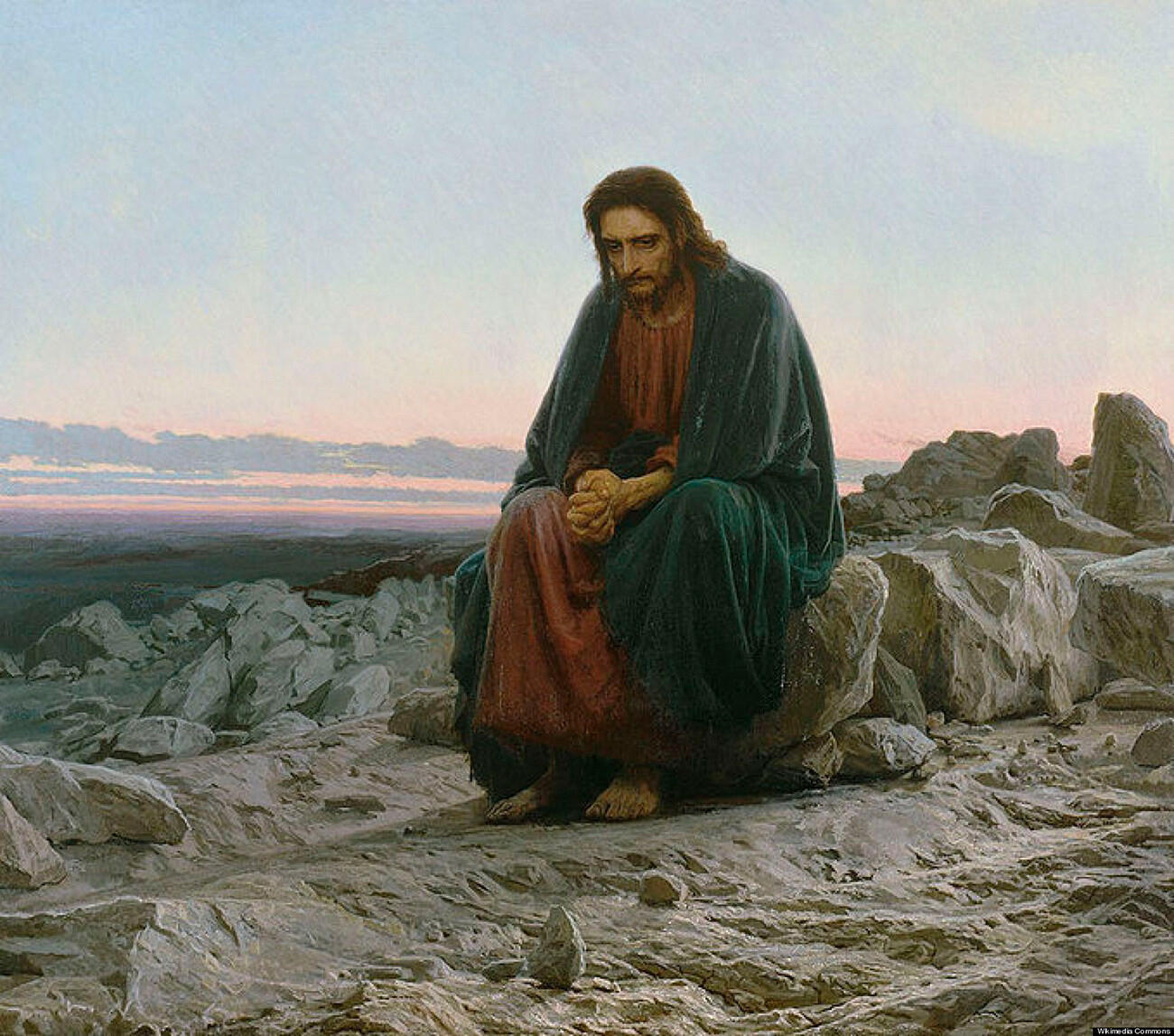
Подвиг есть и в сраженье,
There is heroism in battle,Подвиг есть и в борьбе;
There is heroism in struggle;Высший подвиг — в терпенье,
The highest heroism is in endurance,В любви и мольбе.
In love and in prayer.⸻Если сердце заныло
If your heart has achedПеред злобой людской,
In the face of human malice,Иль насилье схватило
Or violence has seized youТебя цепью стальной;
With a chain of steel;Если скорби земные
If earthly sorrowsЖалом в душу впились, —
Have stung deep into your soul —С верой бодрой и смелой
With cheerful and brave faithТы за подвиг берись:
Take up your heroic path:⸻Есть у подвига крылья,
Heroism has wings,И взлетишь ты на них
And you shall rise upon themБез труда, без усилья
Without effort, without strainВыше мраков земных;
Above the gloom of the earth;Выше крыши темницы,
Above the prison roof,Выше злобы слепой,
Above blind hatred,Выше воплей и криков
Above the screams and shoutsГордой черни людской!
Of the proud human rabble!⸻Подвиг есть и в сраженье,
There is heroism in battle,Подвиг есть и в борьбе;
There is heroism in struggle;Высший подвиг — в терпенье,
The highest heroism is in endurance,В любви и мольбе.
In love and in prayer.
Благословляю вас, леса
I bless you, forests
Lyrics by Alexei Tolstoi,
Music by Pyotr Tchaikovsky
The painting “Above Eternal Peace” by Isaac Levitan, 1894
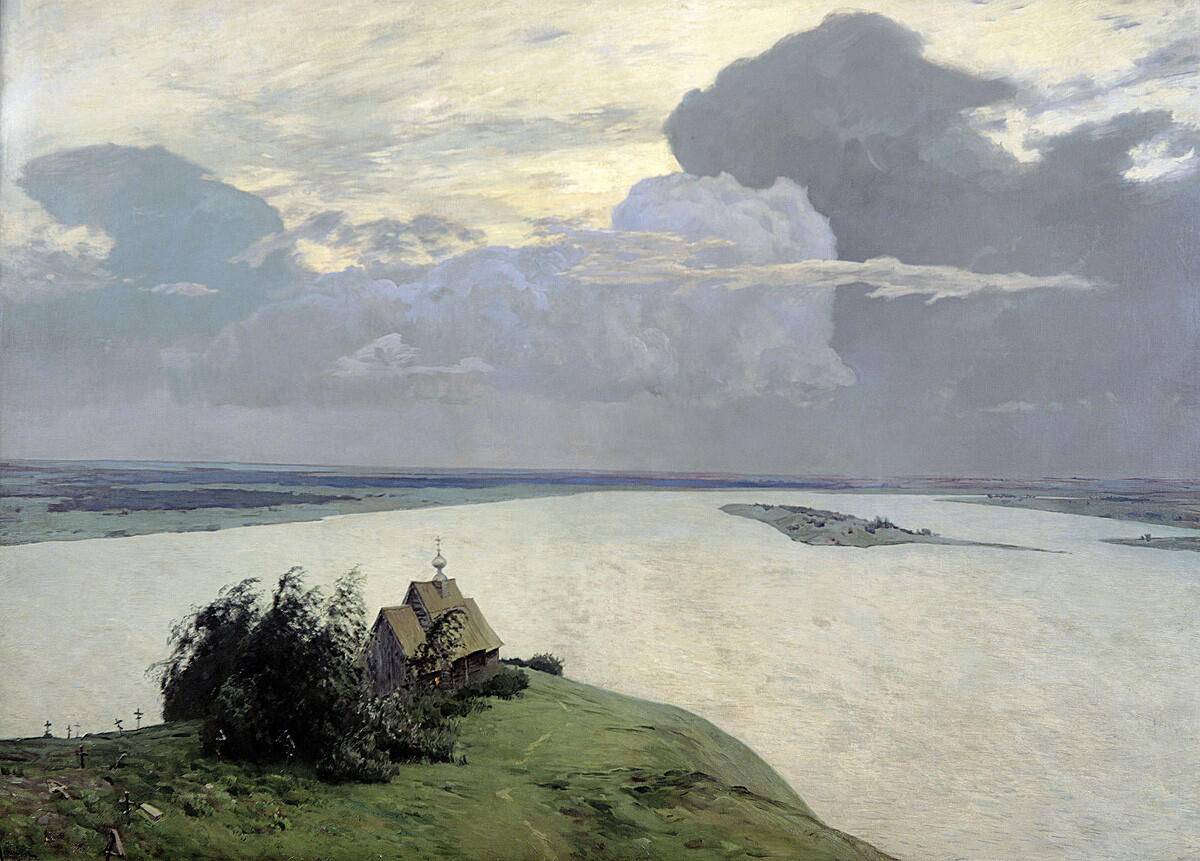
Благословляю вас, леса,
I bless you, forests,Долины, нивы, горы, воды!
Valleys, fields, mountains, and waters!Благословляю я свободу
I bless freedomИ голубые небеса!
And the blue skies!⸻И посох мой благословляю,
I bless my staff,И эту бедную суму,
And this poor satchel,И степь от краю и до краю,
And the steppe from edge to edge,И солнца свет, и ночи тьму,
And sunlight — and the darkness of night,⸻И одинокую тропинку,
And the lonely pathПо коей, нищий, я иду,
Along which I, a beggar, walk,И в поле каждую былинку,
And every blade of grass in the field,И в небе каждую звезду!
And every star up in the sky!⸻О, если б мог всю жизнь смешать я,
Oh, if only I could blend my whole lifeВсю душу вместе с вами слить!
And merge my whole soul with you!⸻О, если б мог в мои объятья
Oh, if only into my embraceЯ вас, враги, друзья и братья,
I could gather you — foes, friends, and brothers,И всю природу, и всю природу
And all of nature, all of natureВ мои объятья заключить!..
Enfold into my arms!..
Songs and Dances of Death
Lyrics by Arseniy Golehischev-Kutuzov,
Music by Modest Mussorgsky
The painting "The Apotheosis of War" by Vasily Vereschagin, 1871
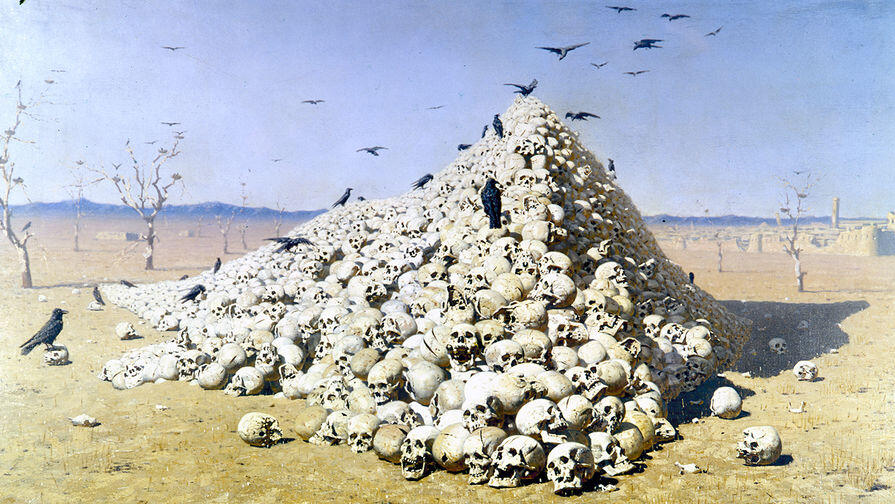
Lullaby
Стонет ребёнок… Свеча, нагорая,
The child is moaning… The candle, burning low,Тускло мерцает кругом.
Flickers dimly all around.Целую ночь колыбельку качая,
All through the night rocking the cradle,Мать не забылася сном.
The mother hasn’t once fallen asleep.⸻Раным-ранёхонько в дверь осторожно
Very early, gently at the doorСмерть сердобольная стук!
Knocks tender-hearted Death!Вздрогнула мать, оглянулась тревожно…
The mother shudders, looks around in alarm…“Полно пугаться, мой друг!
“Don’t be afraid, my dear!⸻Бледное утро уж смотрит в окошко…
Pale dawn is already peeking through the window…Плача, тоскуя, любля,
You’ve cried, grieved, loved,Ты утомилась, вздремни-ка немножко,
You’re exhausted — take a little nap,Я посижу за тебя.
I’ll sit here in your place.”⸻“Угомонить ты дитя не сумела.
You couldn’t soothe the baby.Слаще тебя я спою.”
I’ll sing sweeter than you.”“Тише! ребёнок мой мечется, бьётся,
Hush! My child is tossing, struggling,Душу терзая мою!”
Tearing at my soul!”⸻“Ну, да со мною он скоро уймётся.
But he’ll calm down quickly with me.Баюшки, баю, баю.”
Lullaby, hush-a-bye.”“Щёчки бледнеют, слабеет дыханье…
His cheeks are paling, his breath grows weaker…Да замолчи-же, молю!”
Oh be silent, I beg you!”⸻“Доброе знаменье, стихнет страданье,
It’s a good sign — the pain will ease,Баюшки, баю, баю.”
Lullaby, hush-a-bye.”“Прочь ты, проклятая!
Away with you, cursed one!Лаской своею сгубишь ты радость мою!”
With your caress you’ll destroy my joy!”⸻“Нет, мирный сон я младенцу навею.
No — I bring peaceful sleep to the baby.Баюшки, баю, баю.”
Lullaby, hush-a-bye.”“Сжалься, пожди допевать хоть мгновенье,
Have mercy — wait just a moment to finishСтрашную песню твою!”
Your dreadful song!”⸻“Видишь, уснул он под тихое пенье.
You see? He’s fallen asleep to soft singing.Баюшки, баю, баю.”
Lullaby, hush-a-bye.”
Serenade
Нега волшебная, ночь голубая,
Enchanted sweetness, blue is the night,Трепетный сумрак весны.
The trembling dusk of spring.Внемлет, поникнув головкой, больная
The sick girl bows her head and listensШёпот ночной тишины.
To the whisper of midnight stillness.⸻Сон не смыкает блестящие очи,
Sleep won’t close her shining eyes,Жизнь к наслажденью зовёт,
Life is calling her to pleasure,А под окошком в молчаньи полночи
But beneath her window, in midnight silence,Смерть серенаду поёт:
Death sings a serenade:⸻“В мраке неволи суровой и тесной
‘In the dark of harsh, confining bondage,Молодость вянет твоя;
Your youth is withering away;Рыцарь неведомый, силой чудесной
I, an unknown knight with wondrous power,Освобожу я тебя.
Shall come and set you free.⸻Встань, посмотри на себя: красотою
Rise — look at yourself: with beautyЛик твой прозрачный блестит,
Your shining face is aglow,Щёки румяны, волнистой косою
Your cheeks are rosy, your waving braidСтан твой, как тучей обвит.
Wraps your body like a cloud.⸻Пристальных глаз голубое сиянье,
The blue glow of your piercing eyesЯрче небес и огня;
Is brighter than sky or flame;Зноем полуденным веет дыханье…
Your breath is like midday heat…Ты обольстила меня.
You’ve enchanted me.⸻Слух твой пленился моей серенадой,
Your ear was captured by my serenade,Рыцаря шёпот твой звал,
Your whisper summoned the knight,Рыцарь пришёл за последней наградой:
The knight has come for his final reward:Час упоенья настал.
The hour of rapture has come.⸻Нежен твой стан, упоителен трепет…
Your form is tender, your trembling — sweet…О, задушу я тебя
Oh, I shall strangle youВ крепких объятьях: любовный мой лепет
In my tight embrace; my lover’s murmur —Слушай!… молчи!… Ты моя!”
Listen!… Be silent!… You are mine!”
Trepak
Лес да поляны, безлюдье кругом.
Forest and meadows, all empty around.Вьюга и плачет и стонет,
The blizzard is crying and groaning,Чуется, будто во мраке ночном,
It feels as though in the dark of night,Злая, кого-то хоронит;
Something wicked is burying someone.⸻Глядь, так и есть! В темноте мужика
Look — so it is! In the dark, a peasantСмерть обнимает, ласкает,
Is hugged and caressed by Death,С пьяненьким пляшет вдвоём трепака,
Dancing a trepak with the drunkard,На ухо песнь напевает:
Singing a song into his ear:⸻«Ой, мужичок, старичок убогой,
Oh little peasant, poor old fellow,Пьян напился, поплёлся дорогой,
Got drunk and stumbled along the road,А мятель-то, ведьма, поднялась, взыграла.
And the blizzard — a witch — has risen and raged.С поля в лес дремучий невзначай загнала.
By chance it drove him from field into forest.⸻Горем, тоской да нуждой томимый,
Worn by grief, sorrow, and want,Ляг, прикорни, да усни, родимый!
Lie down, rest, and sleep, my dear!Я тебя, голубчик мой, снежком согрею,
I’ll warm you, my darling, with snow,** тебя великую игру затею.**
And around you I’ll start a grand game.⸻Взбей-ка постель, ты мятель-лебёдка!
Fluff up the bed, you blizzard-swan!Гей, начинай, запевай погодка!
Hey, begin — let the weather sing!Сказку, да такую, чтоб всю ночь тянулась,
A tale so long it will last all night,Чтоб пьянчуге крепко под неё заснулось!
So the drunkard sleeps soundly to it!⸻Ой, вы леса, небеса, да тучи,
Oh you forests, skies, and clouds,Темь, ветерок, да снежок летучий!
Darkness, little wind, and flying snow!Свейтесь пеленою, снежной, пуховою;
Weave into a snowy, downy shroud;Ею, как младенца, старичка прикрою…
With it I’ll cover the old man like a baby…⸻Спи, мой дружок, мужичок счастливый,
Sleep, my friend, little lucky peasant,Лето пришло, расцвело!
Summer has come, all in bloom!Над нивой солнышко смеётся да серпы гуляют,
Above the field the sun laughs, sickles gleam,Песенка несётся, голубки летают…
A song rings out, and doves fly through the air…
Fieldmarshal
Грохочет битва, блешут брони,
The battle rumbles, armours gleam,Орудья жадные ревут,
Greedy cannons roar,Бегут полки, несутся кони
Regiments rush, horses gallop,И реки красные текут.
And red rivers flow.⸻Пылает полдень, люди бьются;
Noon blazes, men are fighting;Склонилось солнце, бой сильней;
The sun has lowered, the battle is fiercer;Закат бледнеет, но дерутся
Sunset fades, but still they fightВраги все яростней и злей.
Enemies more furious and cruel.⸻И пала ночь на поле брани.
And night fell on the field of battle.Дружины в мраке разошлись…
The troops dispersed into darkness…Всё стихло, и в ночном тумане
All grew silent, and in the night fogСтенанья к небу поднялись.
Groans rose up to the sky.⸻Тогда, озарена луною,
Then, lit by the moon,На боевом своём коне,
On her warhorse,Костей сверкая белизною,
Bones gleaming white,Явилась смерть; и в тишине,
Death appeared; and in the silence,⸻Внимая вопли и молитвы,
Listening to cries and prayers,Довольства гордого полна,
Full of proud satisfaction,Как полководец место битвы
Like a general, the battlefieldКругом объехала она.
She rode around.⸻На холм поднявшись, оглянулась,
Climbing a hill, she looked around,Остановилась, улыбнулась…
She stopped, and smiled…И над равниной боевой
And over the battle plainРаздался голос роковой:
A fateful voice rang out:⸻“Кончена битва! я всех победила!
“The battle is over! I have conquered all!Все предо мной вы смирились, бойцы!
All of you, warriors, have bowed before me!Жизнь вас поссорила, я помирила!
Life set you against each other, I reconciled you!Дружно вставайте на смотр, мертвецы!
Rise in unity for inspection, O dead!⸻Маршем торжественным мимо пройдите,
March past in solemn parade,Войско моё я хочу сосчитать;
I want to count my army;В землю потом свои кости сложите,
Then lay down your bones in the earth,Сладко от жизни в земле отдыхать!
It is sweet to rest from life in the ground!⸻Годы незримо пройдут за годами,
Years will pass invisibly one after another,В людях исчезнет и память о вас.
In people, even memory of you will vanish.Я не забуду и громко над вами
But I will not forget and loudly above youПир буду править в полуночный час!
Will hold my feast at the midnight hour!⸻Пляской тяжёлою землю сырую
With a heavy dance I’ll stomp the damp earthЯ притопчу, чтобы сень гробовую
I will press down so that the grave’s shadeКости покинуть вовек не могли,
Your bones may never leave,Чтоб никогда вам не встать из земли!”
So that you may never rise from the ground!”
about artists
Efim Zavalny & Rebekka Magomedova
We’re Efim Zavalny and Rebekka Magomedova—musicians from St Petersburg.Until 2022, we worked at the Mariinsky Theatre, but after the start of the war in Ukraine we left Russia for political reasons. We first moved to Azerbaijan, where we founded OperaClass, an educational project for young singers and pianists.Since 2024 we have been based in London, continuing to perform chamber and operatic programmes.Efim’s performances have been praised for their expressive power and emotional precision by international media such as The New York Times, The Wall Street Journal, and The Observer.His stage roles include Eugene Onegin, Prince Andrei Bolkonsky (War and Peace), Demon, Don Giovanni, Aleko, and many others.For over a decade we have performed together as a baritone–piano duo, developing a shared musical language rooted in trust, experience, and curiosity.
Sign up to receive updates about our concerts and projects.
